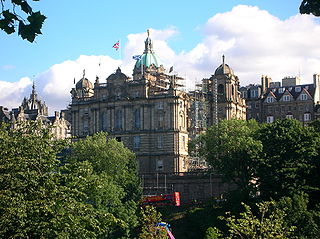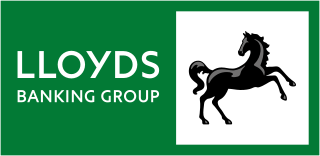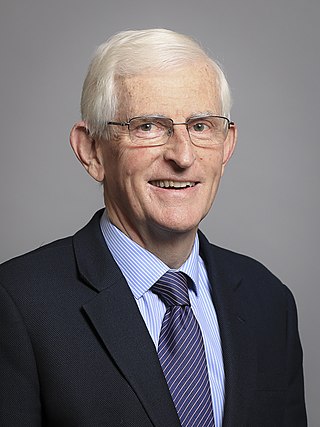Related Research Articles
In the United Kingdom and the British Overseas Territories, personal bravery, achievement, or service are rewarded with honours. The honours system consists of three types of award:

The Financial Services Authority (FSA) was a quasi-judicial body accountable for the regulation of the financial services industry in the United Kingdom between 2001 and 2013. It was founded as the Securities and Investments Board (SIB) in 1985. Its board was appointed by the Treasury, although it operated independently of government. It was structured as a company limited by guarantee and was funded entirely by fees charged to the financial services industry.

NatWest Group plc is a British banking and insurance holding company, based in Edinburgh, Scotland. The group operates a wide variety of banking brands offering personal and business banking, private banking, investment banking, insurance and corporate finance. In the United Kingdom, its main subsidiary companies are National Westminster Bank, Royal Bank of Scotland, NatWest Markets and Coutts. The group issues banknotes in Scotland and Northern Ireland; as of 2014, the Royal Bank of Scotland was the only bank in the UK to continue to print £1 notes.

The Most Honourable Order of the Bath is a British order of chivalry founded by King George I on 18 May 1725. The name derives from the elaborate medieval ceremony for appointing a knight, of which bathing was an element. Knights so created were known as "Knights of the Bath". George I constituted the Knights of the Bath a regular "Military Order". He did not revive the Order of the Bath, which had not previously existed as an Order, in the sense of a body of knights governed by a set of statutes and whose numbers were replenished when vacancies occurred.

Lloyds Bank plc is a British retail and commercial bank with branches across England and Wales. It has traditionally been considered one of the "Big Four" clearing banks. Lloyds Bank is the largest retail bank in Britain, and has an extensive network of branches and ATMs in England and Wales and offers 24-hour telephone and online banking services. As of 2012 it had 16 million personal customers and small business accounts.
Frederick Anderson Goodwin FRSE FCIBS is a Scottish chartered accountant and former banker who was Chief executive officer (CEO) of the Royal Bank of Scotland Group (RBS) between 2001 and 2009.
Sir Lynton Keith Crosby is an Australian political strategist who has managed election campaigns for right-of-centre parties in several countries.
Sir Thomas Fulton Wilson McKillop, FRS, FRSE is a Scottish chemist, who was CEO of AstraZeneca PLC from 1999 until 2006 and chairman of the RBS Group from 2006 until 2008.
Henry Dennistoun "Dennis" Stevenson, Baron Stevenson of Coddenham, is a British businessman and former chairman of HBOS. He sits on the crossbenches in the House of Lords.
Sir Maurice Victor Blank is an English businessman and philanthropist. He is the former Chairman of Lloyds TSB and the current Chairman of several educational and charitable organisations including the Social Mobility Foundation, UJS Hillel and Wellbeing of Women.
James Robert Crosby is an English banker. He was Deputy Chairman of the Financial Services Authority from January 2004 until he resigned on 11 February 2006. He had previously been the chief executive of Halifax Bank until its merger with Bank of Scotland to form HBOS, of which he was Chief Executive until 2006. On 3 December 2012, Crosby was required to appear before Britain's Parliamentary Commission on Banking Standards.

Andy Hornby is an English businessman, currently chief executive of The Restaurant Group, a British chain of restaurants and public houses.

HBOS plc was a banking and insurance company in the United Kingdom, a wholly owned subsidiary of the Lloyds Banking Group, having been taken over in January 2009. It was the holding company for Bank of Scotland plc, which operated the Bank of Scotland and Halifax brands in the UK, as well as HBOS Australia and HBOS Insurance & Investment Group Limited, the group's insurance division.

Lloyds Banking Group is a British financial institution formed through the acquisition of HBOS by Lloyds TSB in 2009. It is one of the UK's largest financial services organisations, with 30 million customers and 65,000 employees. Lloyds Bank was founded in 1765 but the wider Group's heritage extends over 320 years, dating back to the founding of the Bank of Scotland by the Parliament of Scotland in 1695.
Paul Russell Moore was best known as the HBOS whistleblower following his dismissal from Halifax Bank of Scotland in 2004. Moore was the bank's Head of Group Regulatory Risk and was fired from the role by HBOS Group Chief Executive Office James Crosby following his warnings to the Board about HBOS's risky sales strategies.

Benjamin Russell Mackintosh Stoneham, Baron Stoneham of Droxford is a British peer, journalist, and Liberal Democrat politician. He is currently the Liberal Democrat Chief Whip in the House of Lords, having been elected to that position in October 2016.
The Honours Forfeiture Committee is an ad hoc committee convened under the United Kingdom Cabinet Office, which considers cases referred to the Prime Minister of the United Kingdom where an individual's actions subsequent to their being awarded a British honour raises the question of whether they should be allowed to continue to be a holder. Recommendations are made to the Monarch of the United Kingdom, who has the sole authority to rescind an honour.

Letters patent, in the United Kingdom, are legal instruments generally issued by the monarch granting an office, right, title, or status to a person. Letters patent have also been used for the creation of corporations or offices, for granting city status, for granting coat of arms, and for granting royal assent.
References
- ↑ Chronological Tables of the Private and Personal Acts.Part 2 (1603-1627). Legislation.gov.uk. Accessed on 4 May 2012. See note 4.
- ↑ Lee, Sidney and Sean Kelsy (2004). "Giles Mompesson". The Oxford Dictionary of National Biography vol. 38. London: Oxford University Press. pp. 569–572.
- ↑ "No. 29651". The London Gazette . 4 July 1916. p. 6596.
- ↑ "On This Day: 16 November". BBC . 16 November 1979. Retrieved 18 February 2010.
- ↑ "Former RBS boss Fred Goodwin stripped of knighthood". BBC . 31 January 2012. Retrieved 7 February 2013.
- ↑ "Ex-HBOS chief Sir James Crosby asks to return knighthood". BBC . 9 April 2013. Retrieved 11 April 2013.